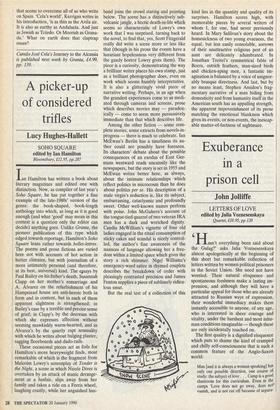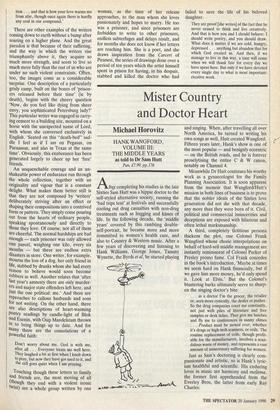Exuberance in a prison cell
John Jolliffe
LETTERS OF LOVE edited by Julia Voznesenskaya
Quartet, f10.95, pp.120 asn't everything been said about the Gulag?' asks Julia Voznesenskaya almost apologetically at the beginning of this short but remarkable collection of letters written by women political prisoners in the Soviet Union. She need not have worried. Their natural eloquence and spontaneous freshness make a lasting im- pression, and although they will have a particular appeal for those who are already attracted to Russian ways of expression, their wonderful immediacy makes them instantly accessible to anyone, of any age, who is interested in sheer courage and vitality, under the harshest and most inhu- man conditions imaginable — though these are only incidentally touched on.
The first quality is a dignified eloquence which puts to shame the kind of cramped and chilly self-consciousness that is such a common feature of the Anglo-Saxon world:
Man [and it is always a woman speaking] has only one possible direction, one course of study: the subject of love Camp is a good classroom for this curriculum. Even in the camps 'Love does not go away, does not' vanish, and is not cut off because of separa- tion . . and that is how your love warms me from afar, though once again there is hardly any coal in our compound.'
There are other examples of the writers coming down to earth without a bump after soaring on a higher plane. And the great paradox is that because of their suffering, and the way in which the writers rise triumphantly above it, they acquire so much more strength, and seem to live so much more fully than the rest of us who are under no such violent constraints. Otten, too, the images come as a considerable surprise. One description of a particularly grisly camp, built on the bones of 'prison- ers released before their time' (ie by death), begins with the cheery question `Now, do you feel like dying from sheer envy, you sophisticated Petersburg lady?' This particular writer was engaged in carry- ing cement to a building site, mounted on a horse with the unexpected name of Lord, with whom she conversed exclusively in English. 'Seated on this "death-bed" sad- dle I feel as if I am on Pegasus, on Parnassus, and also in Texas at the same time'. Obviously, this exuberance has been generated largely to cheer up her 'free' friends.
An unquenchable courage and an un- shakeable power of endurance run through the whole collection, together with an originality and vigour that is a constant delight. What makes them better still is that they are not composed by 'writers' deliberately striving after an effect or shaping their compositions into a contrived form or pattern. They simply come pouring out from the hearts of ordinary people, speaking spontaneously and directly to those they love. Of course, not all of them are cheerful. The normal hardships are bad enough — each prisoner was only allowed one parcel, weighing one kilo, every six months — but there are endless extra disasters in store. One writer, for example, mourns the loss of a dog, her only friend in life, stabbed by drunks whom she had every reason to believe would soon become robbers as well. Another relates that 'after last year's amnesty there are only murder- ers and major state offenders left here, and Just the one political: me.' And there are reproaches to callous husbands and sons for not writing. On the other hand, there are also descriptions of heart-warming Poetry readings by candle-light of Blok and Esenin, with Osip Mandelstam thrown In to bring things up to date. And for many there are the consolations of a Powerful faith:
Don't worry about me. God is with me, after all . . . Everyone treats me well here. They laughed a bit at first when I knelt down to pray, but now they have got used to it, and the cell goes quiet when I am praying.
Touching though these letters to family and friends are, the most moving of all (though they end with a violent ironic twist) are a whole group written by one woman, as the time of her release approaches, to the man whom she loves passionately and hopes to marry. He too was a prisoner, and since prisoners are forbidden to write to other prisoners, endless subterfuges and delays result, and for months she does not know if her letters are reaching him. She is a poet, and she draws inspiration from the Carceri of Piranesi, the series of drawings done over a period of ten years which the artist himself spent in prison for having, in his despair, stabbed and killed the doctor who had failed to save the life of his beloved daughter.
They are proof [she writes] of the fact that he never ceased to think and live creatively. And that is how you and I should behave: I should write poetry, and you should draw. What does it matter if we are cold, hungry, depressed . . . anything but abandon that for which God created us. And then, if we manage to live in this way, a time will come when we will thank fate for every day we have spent here. But only if we have devoted every single day to what is most important: creative work.



















































 Previous page
Previous page